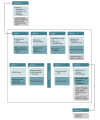A Mindfulness-Based App Intervention for Pregnant Women: Protocol for a Pilot Feasibility Study
- PMID: 38567964
- PMCID: PMC11127176
- DOI: 10.2196/53890
A Mindfulness-Based App Intervention for Pregnant Women: Protocol for a Pilot Feasibility Study
Abstract
Background: Pregnancy is a complex time characterized by major transformations in a woman, which impact her physical, mental, and social well-being. How a woman adapts to these changes can affect her quality of life and psychological well-being. The literature indicates that pregnant women commonly experience psychological symptoms, with anxiety, stress, and depression being among the most frequent. Hence, promoting a healthy lifestyle focused on women's psychological well-being is crucial. Recently developed digital solutions have assumed a crucial role in supporting psychological well-being in physiologically pregnant women. Therefore, the need becomes evident for the development and implementation of digital solutions, such as a virtual coach implemented in a smartphone, as a support for the psychological well-being of pregnant women who do not present psychological and psychiatric disorders.
Objective: This study aims to assess the feasibility, acceptability, and utility of a mindfulness-based mobile app. The primary objective is to explore the feasibility of using a virtual coach, Maia, developed within the TreC Mamma app to promote women's psychological well-being during pregnancy through a psychoeducational module based on mindfulness. Finally, through the delivery of this module, the level of psychological well-being will be explored as a secondary objective.
Methods: This is a proof-of-concept study in which a small sample (N=50) is sufficient to achieve the intended purposes. Recruitment will occur within the group of pregnant women belonging to the pregnancy care services of the Trento Azienda Provinciale per i Servizi Sanitari di Trento. The convenience sampling method will be used. Maia will interact with the participating women for 8 weeks, starting from weeks 24 and 26 of pregnancy. Specifically, there will be 2 sessions per week, which the woman can choose, to allow more flexibility toward her needs.
Results: The psychoeducational pathway is expected to lead to significant results in terms of usability and engagement in women's interactions with Maia. Furthermore, it is anticipated that there will be improvements in psychological well-being and overall quality of life. The analysis of the data collected in this study will be mainly descriptive, orientated toward assessing the achievement of the study objectives.
Conclusions: Literature has shown that women preferred web-based support during the perinatal period, suggesting that implementing digital interventions can overcome barriers to social stigma and asking for help. Maia can be a valuable resource for regular psychoeducational support for women during pregnancy.
International registered report identifier (irrid): RR1-10.2196/53890.
Keywords: development; digital solution; eHealth; feasibility study; intervention; mHealth; mindfulness; mindfulness based; mobile apps; mobile health; mobile phone; pregnancy; pregnant; pregnant women; promoting well-being; psychological symptoms; quality of life; smartphone; usability; user-centered design; virtual coach; well-being; women.
©Silvia Rizzi, Stefania Poggianella, Maria Chiara Pavesi, Lorenzo Gios, Giorgia Bincoletto, Isabella Scolari, Claudia Paoli, Debora Marroni, Irene Tassinari, Barbara Baietti, Anna Gianatti, Veronica Albertini, Barbara Burlon, Vanda Chiodega, Barbara Endrizzi, Elena Benini, Chiara Guella, Erik Gadotti, Stefano Forti, Fabrizio Taddei. Originally published in JMIR Research Protocols (https://www.researchprotocols.org), 10.05.2024.
Conflict of interest statement
Conflicts of Interest: None declared.
Figures


References
-
- Stern DN. The Motherhood Constellation: A Unified View of Parent-Infant Psychotherapy. New York, NY: Routledge; 2018.
-
- Goodman JH, Guarino A, Chenausky K, Klein L, Prager J, Petersen R, Forget A, Freeman M. CALM Pregnancy: results of a pilot study of mindfulness-based cognitive therapy for perinatal anxiety. Arch Womens Ment Health. 2014 Oct;17(5):373–87. doi: 10.1007/s00737-013-0402-7. https://europepmc.org/abstract/MED/24449191 - DOI - PMC - PubMed
-
- Zarenejad M, Yazdkhasti M, Rahimzadeh M, Mehdizadeh Tourzani Z, Esmaelzadeh-Saeieh S. The effect of mindfulness-based stress reduction on maternal anxiety and self-efficacy: a randomized controlled trial. Brain Behav. 2020 Apr;10(4):e01561. doi: 10.1002/brb3.1561. https://europepmc.org/abstract/MED/32162450 - DOI - PMC - PubMed
-
- Woods SM, Melville JL, Guo Y, Fan MY, Gavin A. Psychosocial stress during pregnancy. Am J Obstet Gynecol. 2010 Jan;202(1):61.e1–7. doi: 10.1016/j.ajog.2009.07.041. https://europepmc.org/abstract/MED/19766975 S0002-9378(09)00826-6 - DOI - PMC - PubMed
-
- Fonseca A, Gorayeb R, Canavarro MC. Women׳s help-seeking behaviours for depressive symptoms during the perinatal period: socio-demographic and clinical correlates and perceived barriers to seeking professional help. Midwifery. 2015 Dec;31(12):1177–85. doi: 10.1016/j.midw.2015.09.002. doi: 10.1016/j.midw.2015.09.002.S0266-6138(15)00246-6 - DOI - DOI - PubMed
MeSH terms
LinkOut - more resources
Full Text Sources

